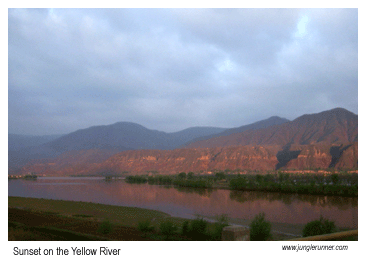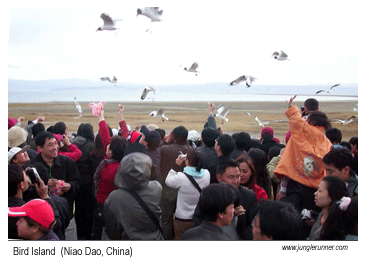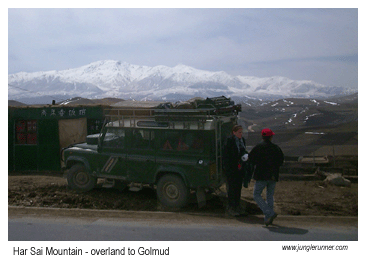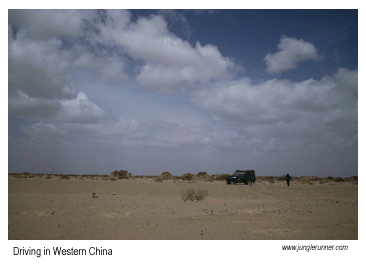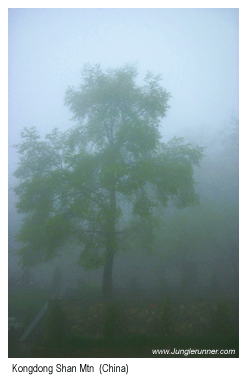
. . . LAND ROVER OVERLAND EXPEDITION
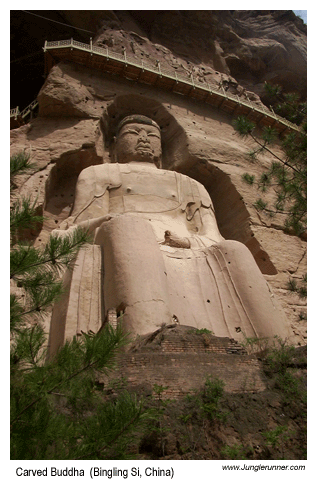
#39 - Western China (Golmud, CHINA) � I think my impressions of China are heavily influenced by my childhood in Africa, it would explain the difference of opinion between Sally and Kathryn, and myself. Personally I am quite impressed with the country. It certainly has its flaws, an inefficient and obsolete form of government, corruption at many levels, and a poor environmental track record. But the country has made incredible strides forward and I see evidence everywhere of a great future. Coming from Africa, a continent that seems trapped in a cycle of self-destruction, I realize how precarious progress can be. For all its shortcomings, in my opinion China is making remarkable progress. Chinese Socialism
It is indeed an odd mixture of ideologies. The government is committed to 'one country, two systems' for Hong Kong and Macao. There is speculation that there would likely be more political change if those in power were not so worried about the possibility of future prosecution for Communism's more egregious sins - like Tiananmen. In the meantime the country has gotten on with the task of getting competitive with the rest of the world. They are tremendously proud of their WTO ascension . Many inefficient government factories have been dramatically cut back or even closed in order to comply with world trade requirements, but most people seem philosophical about the short term hardships. In a country that has seen ups and downs over several thousand years they seem content that all will work out in the end and China will once again have its day in the sun. That kind of patience and forward thinking was quite impressive. Come
out wherever you are And China is uniform. I mean in the core provinces almost everyone is ethnically Han. They share similar traditions, speak one of two languages, and identify strongly with the same history. Sure there are regional differences and rivalries, Beijing natives think Shanghaiese are rude and greedy, people from Shanghai are sure that Beijingers couldn't find their butt without a committee and central directive. But still, that kind of consistency across several hundred million people is almost unheard of anywhere else in the world. And it leads to some challenges. Racism isn't a problem if you are from a wealthy western country, but there have been incidents with black visitors even from America. And the mainstream community doesn't have much respect for the differences of the western provinces. Predominantly Muslim with different traditions, dress, and cuisine, even our guide Allan was uncomfortable once we left Shaanxi province. "This food is very strange, and they don't know how to cook noodles!" he complained as we were searching for a restaurant. Integration is a thorny problem that continues to plague China. Though the western provinces receive much less attention that the Tibet issue, they are also quite distinct from the Chinese mainstream and have long agitated for secession and independent statehood. To it's credit, the central government has changed tactics from the 'stick' to the 'carrot', investing heavily in infrastructure and local industry during the last decade. In the past the emphasis was on a heavy military presence to quell local unrest. These days the brains in the politburo are realizing that if people have something to lose they will be less likely to leave. So during the course of our driving we passed massive highway and railroad construction projects designed to connect the west with the rest of China, reduce the price of consumer products, and make it easier to develop mineral resources. And substantial mosques were under construction in many cities. "The government has decided that religion must be supported" said a man I spoke with. "Not only can we contribute to our own churches but if there is a possibility of tourism we can get government money." Quite an about-face for the propagators of the cultural revolution. What's
In a Name In fact most political scientists would agree that the very best form of government is a benevolent dictatorship. Unfortunately many African experiments have proven that term to be an oxymoron, still, the idea is to have a stable government with the best interest of the people at heart making informed decisions. The benefit of this system is that decisions can be made quickly, policies are implemented without delay, and results are quick. Disastrous if the decisions are ill conceived, but quite effective when progress is heading in the right direction. It's ironic therefore that the Chinese government, a perceived weakness from the outside, is actually proving to be a great strength in the last decade. People are conditioned to obey in this country so when the government says 'Jump!', people say 'how high?'. A recent National Geographic article gives a good example. In the eighties rural poverty was a problem and the authorities decided that logging was an excellent way to generate jobs. A decade later the loss of species, increased flooding, and international outcry caused them to rethink the policy. In an about face they decided to implement the largest tree replanting project ever undertaken. And to substitute income for the rural loggers who lost their jobs they issued a directive to the middle class to get out and be tourists - visit your local forest, enjoy the scenery. Voila. Several dozen national parks are now formed, trees being replanted, water quality subject to stricter dumping rules, rural folks are building guesthouses and restaurants to cope with the boom of national tourists - and we found ourselves wading through a sea of locals to see some birds at Lake Qinghai. That's another amazing thing about the country, things can happen almost overnight. I must say, I was not well informed when I first arrived here and I have to admit that there is a lot more to admire about China than just cheap labour and good food. Granted my expectations are probably lower than most - I've seen a lot of pretty messed up countries in my travels and have low expectations. But to those in the west I would say, give it time and don't be so self righteous, it's likely we will all be taking lessons from China in a couple of decades.
|
All rights reserved
